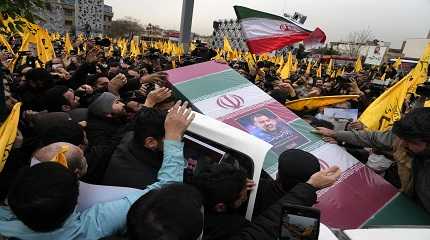
IRBIL, Iraq (AP) — Iraq recalled its ambassador from Tehran for consultations and summoned Iran’s chargé d’affaires in Baghdad on Tuesday in protest over Iranian strikes on northern Iraq that killed several civilians overnight, the Iraqi Foreign Ministry said.
The Iranian attack was “a blatant violation” of Iraq’s sovereignty and “strongly contradicts the principles of good neighborliness and international law, and threatens the security of the region,” the ministry said in a statement.
Iran fired missiles late Monday at what it said were Israeli “spy headquarters” in an upscale neighborhood near the sprawling U.S. Consulate compound in Irbil, the seat of Iraq’s northern semi-autonomous Kurdish region, and at targets linked to the extremist Islamic State group in northern Syria.
Iran’s Revolutionary Guard said in a statement Tuesday that it launched four missiles at IS positions in Syria’s Idlib province and 11 missiles at the Kurdish region in northern Iraq, where it said it hit a center of Mossad, the Israeli intelligence agency.
Qassim al-Araji, the adviser for national security affairs to Iraq’s Prime Minister Mohammed Shia al-Sudani who is heading a committee investigating the attack in Irbil, said Iran’s “claims of targeting a Mossad headquarters are baseless.”
“There is no reason for these attacks and there is no excuse,” Masrour Barzani, prime minister of the Kurdish region, said in a news conference in Davos while attending Tuesday the World Economic Forum. “These attacks should not remain without a response.”
The strikes came at a time of heightened tensions in the region and fears of a wider spillover of the ongoing war in Gaza between Israel and Hamas.
They also came after the Islamic State group claimed responsibility earlier this month for two suicide bombings targeting a commemoration for an Iranian general slain in a 2020 U.S. drone strike. The attack in Kerman killed at least 84 people and wounded 284 others at the ceremony honoring Revolutionary Guard Gen. Qassem Soleimani.
Iranian state media quoted Gen. Hassan Hassanzadeh, one of the commanders of the Revolutionary Guard, as saying that Monday’s strikes were a response to a demand made by the country’s Supreme Leader Ayatollah Ali Khamenei.
He added they will continue their “action” until “the enemies regret” what they did.
Also on Tuesday, Iran launched attacks, using missiles and drones, targeting what it described as bases for the militant group Jaish al-Adl, a Sunni militant group largely operating across the border in nuclear-armed Pakistan, state-run IRNA news agency said.
Pakistan did not immediately acknowledge the attack.
Last month, Iran accused Israel of killing a high-ranking Iranian general, Seyed Razi Mousavi, in an airstrike on a Damascus neighborhood.
It was unclear whether the strikes in Syria had, in fact, hit any targets associated with the Islamic State group.
Mounir al-Mustafa, deputy director of the civil defense in northwest Syria, also known as the White Helmets, said one of the strikes in Idlib targeted a medical clinic that was no longer operating in the village of Talteta in northwest Idlib province. Two civilians suffered minor injuries, he said.
Sami al-Qassim, who lives near the targeted site, said the clinic was empty and there were no militant activities in the area.
The Iranian strike in Irbil killed at least four people, among them Peshraw Dizayi, a prominent local businessman with a portfolio that included real estate and security services companies, along with members of his family.
The United States condemned what State Department spokesperson Matthew Miller described as “Iran’s reckless missile strikes.”
Iranian Foreign Ministry spokesperson Nasser Kanaani said in a statement that the strikes in Iraq and Syria were “in line with the resolute defense of the country’s sovereignty and security, countering terrorism, and part of the Islamic Republic’s punishment against those who threaten the country’s security.”
He said that Iran in “a precise and targeted operation, identified the headquarters of the criminals and targeted them with accurate and precision-guided projectiles.”
A few hundred demonstrators gathered in Irbil on Tuesday to protest the attacks.
In northwest Syria, a missile strike Tuesday morning hit an area housing teenage detainees at the Sinaa prison in the city of Hassakeh, where hundreds of IS fighters are jailed. The U.S.-backed Kurdish-led Syrian Democratic Forces, which operates the prison, said the strike caused minor injuries and sparked an unsuccessful prison break attempt.
SDF spokesman Siamand Ali told The Associated Press that “we have no specific information on who was behind the attack.”




